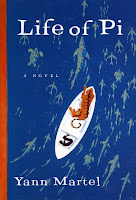The Life of Pi - Yann Martel
When it comes to celebrating Yann Martel's visionary novel, I am a little late to the party. The novel first arrived and hovered at the periphery of my awareness when I was quite young, as one of the many uncorrected book proofs that filtered through the offices of my Grandma's bookshop and ended up in our living room. Like Lewyka's 'A Short History of Tractors in the Ukraine' which lay beside it, the title was sufficiently kooky for the plot to prove elusive at first glance - I only realised later that I declined to read the novel because my pre-teen self had assumed it was about Maths. (Maths and I do not get on.)
The book deserves all the praise that it was rightly given, winning the Man Booker Prize in 2002 and being adapted into Ang Lee's stunning miracle of a film in 2012, for which he won Best Director.
I saw the film first, and then read the book - a mortal sin, I know - and my next admission is even more disgraceful...that I may have preferred the film. The novel is beautiful and heartfelt, and Piscine Molitor Patel proves an immensely likeable narrator of his own story. The sufferings of Pi's animal companions are painful to read, as was the descriptions of Pi's loneliness and debasement. Strangely absent though was my emotion, and I think Pi's, at the loss of his family. I believe I felt more attached to Richard Parker, the peculiarly named tiger who is shipwrecked along with the protagonist when the Molitor family pack up their corner of a lush, resplendent India and set sail with their menagerie for the austerely sensible Canada. In retrospect, and for those who know the story, however, this is surely Martel's point. The Pi missing from the movie is one who muses for pages about the meaning of life, the human qualities of his beloved animals, and who prays unwaveringly to the many gods who guide and prosper his story.
Towards the end of the book, perhaps coloured by my expectant eagerness to reach the philosophic conclusion, I felt my attention tailing off. The episode on Pi's carnivorous island was far more unsettling in the film, where phosphorescent light, 3D glasses and stunning visual effects outshone Martel's earnest prose.
The ending leaves you with your heart in your throat - this is definitely book club fodder; a novel you want to discuss. 'A story to make you believe in God', Barack Obama himself wrote directly to Martel, calling the book "an elegant proof of God, and the power of storytelling". Impressively put, but the novel's ending did leave me feeling that the religious message had become a little saccharine, suggesting that Pi's faith in his gods is the equivalent of choosing an improbably romantic but more palatable yarn over cold truth. For the non-religious, this may be the case - but the adherents of Christianity, Hinduism and Islam would be quick to disagree.
In all, a treasure. 'The Life of Pi' is practically faultless. Who would have thought that Richard Parker could take up a place in my heart as he did in Pi's?!
Verdict: I loved 'The Life of Pi'! - but watch the film too!
This is hilarious! Check out "The LIE of Pi" >> http://www.buzzfeed.com/ellievhall/removing-a-single-letter-from-the-title-of-famous-books-some
This is hilarious! Check out "The LIE of Pi" >> http://www.buzzfeed.com/ellievhall/removing-a-single-letter-from-the-title-of-famous-books-some





No comments:
Post a Comment